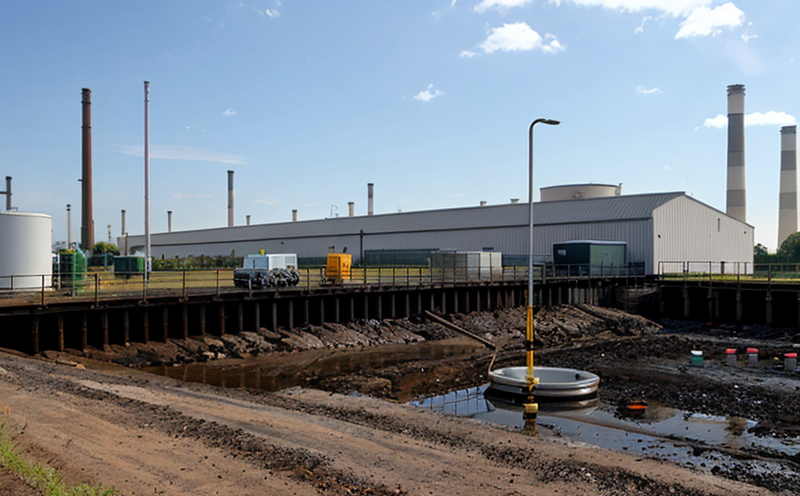ISO 10473 Suspended Particulate Matter Monitoring Test in Industrial Sites
The ISO 10473 standard provides a robust framework for monitoring suspended particulate matter (SPM) levels in industrial environments. This service is crucial for ensuring compliance with environmental regulations and maintaining a safe work environment. SPM refers to solid particles that are carried by air currents, including dust, smoke, mist, and other fine particles. Monitoring these particles helps prevent potential health hazards and environmental damage.
Industries such as manufacturing, construction, mining, and power generation often generate high levels of particulate matter during operations. Overexposure to SPM can lead to respiratory issues in workers, contribute to air pollution, and harm the surrounding ecosystem. Therefore, regular monitoring is essential for regulatory compliance, worker safety, and environmental protection.
The ISO 10473 test involves collecting air samples using a suitable sampling device designed to capture particles within specific size ranges. The collected samples are then analyzed in our laboratory to determine the concentration of particulate matter present. This testing procedure adheres strictly to international standards to ensure accuracy and reliability.
Our service includes pre-collection preparation, on-site monitoring, sample collection, laboratory analysis, and reporting. We use advanced instrumentation such as gravimetric analysis, laser scattering spectrometers, and differential mobility particle sizers (DMPS) to obtain precise results. These instruments help identify the size distribution of particles and their potential impact.
Understanding the SPM levels in industrial sites is critical for several reasons:
- To ensure compliance with local, national, and international environmental regulations.
- To protect worker health by minimizing exposure to harmful particulates.
- To monitor the effectiveness of pollution control measures implemented on-site.
- To contribute to overall environmental sustainability efforts.
Our team of experts ensures that every step of the process adheres strictly to ISO 10473 guidelines. We provide detailed reports and recommendations based on our findings, which can guide necessary corrective actions or improvements in operational procedures.
In summary, the ISO 10473 Suspended Particulate Matter Monitoring Test is vital for maintaining a healthy environment both within industrial sites and beyond their boundaries. By adhering to this standard, businesses demonstrate their commitment to sustainability and corporate responsibility.
Why It Matters
The importance of monitoring suspended particulate matter in industrial settings cannot be overstated. Particulate matter can pose significant risks both to human health and the environment. When inhaled, these particles can cause various respiratory diseases, cardiovascular issues, and even cancer.
In addition to the direct health impacts, high levels of SPM contribute significantly to air pollution. This not only affects the quality of life for nearby communities but also leads to premature aging of materials, increased maintenance costs, and reduced visibility in urban areas.
From a regulatory standpoint, compliance with environmental regulations is mandatory. Penalties for non-compliance can be severe, affecting not just the bottom line but also the reputation of the company involved. By implementing ISO 10473 monitoring protocols, businesses can preemptively address potential issues and avoid costly fines.
The health implications are particularly concerning for industries where workers spend extended periods in confined spaces or outdoors. For example, construction sites, mining operations, and steel plants often face higher risks due to the nature of their activities. Regular monitoring helps identify early signs of exposure and allows for timely intervention measures.
Environmental sustainability is another crucial aspect. By reducing SPM emissions, companies contribute positively to global efforts in combating climate change and improving air quality. This aligns with broader corporate social responsibility goals and enhances public perception of the company.
Why Choose This Test
- Comprehensive Compliance: Our service ensures full compliance with ISO 10473 standards, providing peace of mind regarding regulatory adherence.
- Precision and Reliability: Leveraging advanced instrumentation guarantees accurate and reliable results every time.
- Expertise and Experience: Our team comprises seasoned professionals with extensive experience in environmental testing.
- Customized Solutions: We tailor our services to meet the specific needs of your industrial site, ensuring optimal results.
- Rapid Turnaround Times: Efficient processing ensures timely delivery of reports and recommendations.
- Comprehensive Reporting: Detailed reports provide actionable insights into particulate levels and trends over time.
- Ongoing Support: Our team offers ongoing support to help you maintain optimal SPM levels at all times.
Selecting this test ensures that your industrial site remains in compliance with stringent environmental regulations, thereby safeguarding worker health and contributing positively to the environment. It also demonstrates a commitment to corporate responsibility and sustainability.
Environmental and Sustainability Contributions
The ISO 10473 Suspended Particulate Matter Monitoring Test plays a pivotal role in enhancing environmental quality and promoting sustainable practices within industrial settings. By continuously monitoring SPM levels, industries can take proactive steps to reduce their impact on the environment.
One of the primary objectives is to minimize emissions that contribute to air pollution. This helps in reducing particulate matter that can settle into water bodies, soil, or vegetation, thereby preventing further environmental degradation. The collected data from our tests allows for targeted interventions such as improving ventilation systems, upgrading filtration technologies, and implementing best practices during operations.
Furthermore, the test results contribute to broader sustainability initiatives by informing policy decisions at both corporate and governmental levels. By sharing these findings, industries can advocate for more stringent regulations aimed at reducing overall particulate emissions across sectors. This collaborative approach fosters a healthier planet and supports global efforts in mitigating climate change.
The data generated from ISO 10473 testing also serves as valuable input for research and development activities focused on developing cleaner technologies and processes. Continuous monitoring helps identify emerging trends and challenges, allowing businesses to stay ahead of the curve in implementing innovative solutions.
By committing to regular SPM monitoring through this service, companies not only fulfill their legal obligations but also demonstrate leadership in environmental stewardship. This aligns with broader corporate social responsibility goals, enhancing brand reputation among consumers who increasingly value eco-friendly practices.





